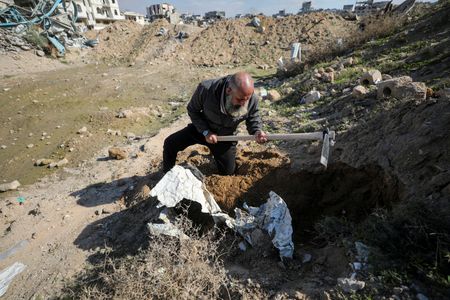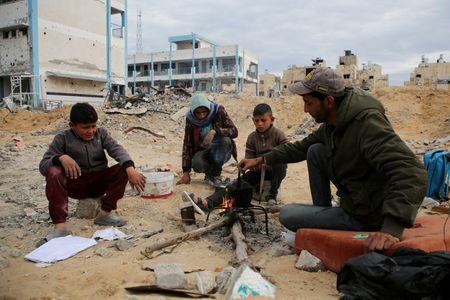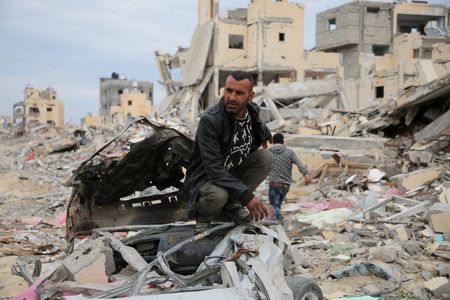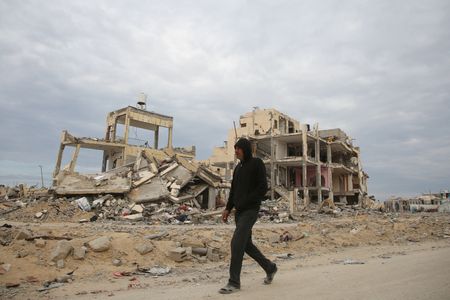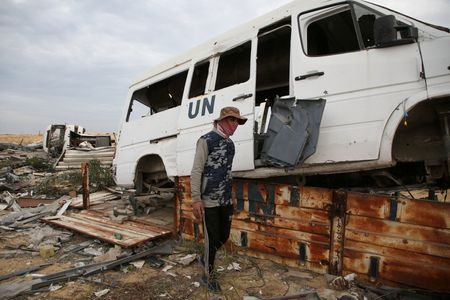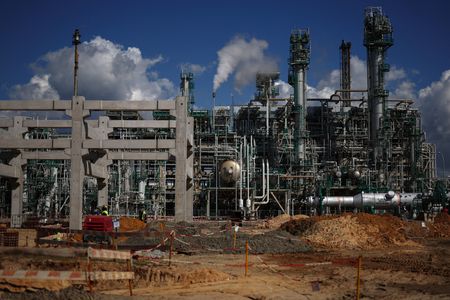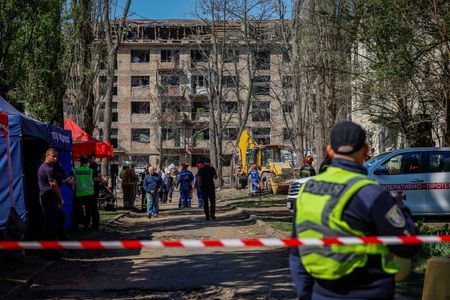By Nidal al-Mughrabi and Dawoud Abu Alkas
CAIRO/GAZA (Reuters) – Guns may have fallen silent in Gaza, but for Mahmoud Abu Dalfa, the agony is not over. He is desperately searching for the bodies of his wife and five children trapped under the rubble of his house since the early months of the war.
Abu Dalfa’s wife and children were among 35 of his extended family who were killed when an Israeli airstrike hit the building in Gaza City’s Shejaia suburb in December 2023, he said. As bombs continued to fall, only three bodies were retrieved.
“My children are still under the rubble. I am trying to get them out… The civil defence came, they tried, but the destruction makes it difficult. We don’t have the equipment here to extract martyrs. We need excavators and a lot of technical tools,” Abu Dalfa told Reuters.
“My wife was killed along with all my five children – three daughters and two sons. I had triplets,” he said.
Burials are usually carried out within a few hours of death in Muslim and Arab communities, and failure to retrieve bodies and ensure dignified burials is agonizing for bereaved families.
“I hope I can bring them out and make them a grave. That’s all I want from this entire world. I don’t want them to build me a house or give me anything else. All I want is a grave for them – to get them out and make them a grave,” said Abu Dalfa.
The Palestinian Civil Emergency Service and medical staff have recovered around 200 bodies since the ceasefire between Hamas and Israel came into effect on Sunday, halting a 15-month conflict that has killed more than 47,000 Gazans.
The war in Gaza was triggered when Palestinian Hamas militants attacked southern Israel on Oct. 7, 2023, killing 1,200 people and taking about 250 as hostages, according to Israeli tallies. At least 94 of those hostages remain in Gaza.
Mahmoud Basal, the head of the service, said extraction operations have been challenged by the lack of earth-moving and heavy machinery, adding that Israel had destroyed several of their vehicles and killed at least 100 of their staff.
Basal estimates the bodies of around 10,000 Palestinians killed in the war are yet to be found and buried.
A U.N. damage assessment released this month showed that clearing over 50 million tonnes of rubble left in the aftermath of Israel’s bombardment could take 21 years and cost up to $1.2 billion.
OPENING AID CROSSINGS
As hundreds of truckloads of aid flowed into Gaza since Sunday, officials from the Palestinian Authority, rivals to Hamas, held meetings with European officials to arrange to assume responsibilities at two vital crossing points with Egypt and Israel.
A Palestinian official familiar with the matter said Egypt sent bulldozers and some engineering vehicles to carry out repairs to the road on the Gaza side of the border that had been damaged by Israel’s ground offensive.
Like Abu Dalfa, thousands of Gaza’s 2.3 million residents are searching for the bodies of relatives either missing under the rubble or buried in mass graves during Israeli ground raids.
Rabah Abulias, a 68-year-old father who lost his son Ashraf in an Israeli attack, wants to give his son a proper grave.
“I know where Ashraf is buried, but his body is with dozens of others, there is no grave for him, there is no tomb stone that carries his name,” he said via a chat app from Gaza City.
“I want to make him a grave, where I can visit him, talk to him and tell him I am sorry I wasn’t there for him.”
(Writing by Nidal al-Mughrabi. Reporting by Nidal al-Mughrabi in Cairo and Dawound Abu Alkas in Gaza; Editing by Ros Russell)


